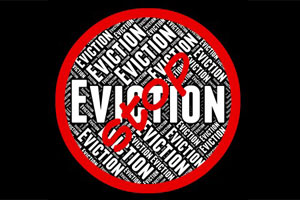As I mentioned in my last blog, my clients are receiving more and more eviction notices that do not even marginally follow the Rent Ordinance rules.
It’s a legal action
An eviction notice is a legal action. The law dictates what needs to be in an eviction notice. What happens if your landlord doesn’t follow the law when giving you notice?
As an attorney fighting for tenants, it’s not my job to educate landlords, nor, as a tenant, is it yours. I always advocate tenants knowing their tenant rights, but again, remember that an eviction notice is part a legal action. You need to think strategically to fight for your rights.
There’s lots of intricacies in the landlord-tenant law, so let’s take a closer look at what happens for non-payment of rent if you live in a rent-controlled apartment.
The start of the eviction process
For some reason, you have not paid the rent. You receive a paper from the landlord called “Notice to Cure or Quit.” This is not actually an eviction. It is, however, a demand to pay the rent, in legal terms called “cure.” In other words, cure this problem or “quit” living in the apartment.
Generally, this is a three-day notice. California law gets tricky about what really constitutes the three days. It depends how the notice is served. The important thing to remember about being served is that the law protects you and others who involved in legal proceedings.
The notice is part of the law
Notice is important. You should have adequate knowledge about legal actions against you. Conversely, improper service—and not following the dictates of the law—could be a part of your legal defense. You do, after all, deserve to know about legal actions against you.
Let’s say that you have received the notice in person. Three days, according to California law, does not necessarily mean three days. It depends on what day you were served. If the third day falls on a weekend or official holiday, then the next regular business day is considered the third day. So if you were served on a Wednesday, the third day would be Saturday, and therefore you would have until the end of Monday to pay your rent.
The eviction notice must be in writing. Legally, it cannot be delivered to you orally and constitute appropriate notice. This is true even in you have an oral rental agreement.
Paying the rent
If you get a notice to cure or quit, and you pay the rent within the appropriate time period, then the eviction notice is no longer valid. Just make sure that you have proof of the payment, in case there is a question later. Pay by personal check or money order. Never pay by cash, because it’s too easy for the landlord to deny that he has received your rent.
Missing the deadline
What happens if you miss the deadline and pay after the eviction notice date and the rules of service I mentioned above? Then the landlord might still evict you…or might not. But this is very tricky territory in which you might not wish venture. This now becomes the issue of the motives of the landlord. So if you have the rent, pay it on time. Protect yourself by following the deadlines.
Withholding rent due to habitability issues
What if you are withholding the rent because of habitability issues? There’s rats scampering around or mold throughout the ceiling or the windows won’t close properly because the building has settled? You’ve spoken to the landlord time and time again. You’ve written him letter after letter. Now you feel like you need to get his attention by withholding the rent.
Even though you’re indignant, even though you’re fed up, I advise my clients not to withhold the rent. You are “muddying the water.” A judge will look at you differently—and not in a good way—if you withhold the rent while contesting your habitability issue. Instead of being just a tenant, you are now also viewed as a debtor. You will have to fight TWO issues instead of one.
I believe everyone should have a place to live that’s habitable. This is an intricate topic which I’ve written about in previous blogs and I will write about in the future.
Who and how to pay
The eviction notice must state the name, telephone number, and address to whom you need to pay the rent if the rent is to be mailed. Payments by mail are considered paid if you have proof that you mailed it. That means that you need to go to the post office and get certified mail. This takes time. But you need to protect yourself.
If you pay it in person, then it should state the usual hours and days that person is available.
Although I rarely see notices that ask you to pay into the landlord’s bank account, California law allows this as long as it’s within five miles of your home.
If you see a problem
Even if the eviction notice is not properly and legally made out, it may not stop the landlord from filing an unlawful detainer, the next step in the eviction process.
Remember, it’s not your job to educate the landlord. That “education” can be used against you.
The Tenant’s Rights book from the San Francisco Tenants Union is an excellent resource for more information.
Not sure whether your eviction notice is legal? You should consider taking to an experienced tenant attorney who knows the law.
Know your rights. Protect yourself.


 (415) 533-0735
(415) 533-0735 (415) 843-0496
(415) 843-0496